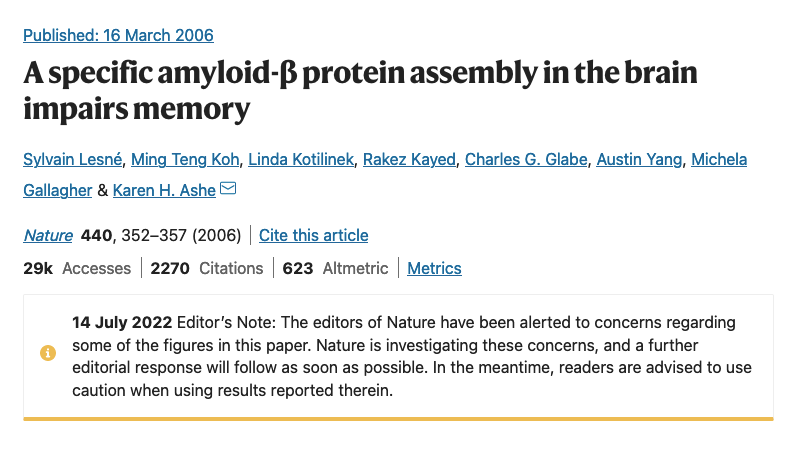The amyloid theory has long formed the basis of many drug development approaches in Alzheimer’s disease (AD). But longstanding questions surrounding this theory, including a July 21 report suggesting potential fabrication in preclinical studies, have called the theory into question.
According to the amyloid theory, stopping the large accumulation of amyloid-beta plaque in the brain could slow or stop AD progression. However, last week’s Science report suggested image alteration and duplication in dozens of journal articles supporting the theory. This includes a prominent 2006 Nature article, which has more than 2,000 citations, linking amyloid-beta accumulation to memory impairment.

Discover B2B Marketing That Performs
Combine business intelligence and editorial excellence to reach engaged professionals across 36 leading media platforms.

Even before the recent accusations of manipulated images, the amyloid theory was already drawing major headlines. In June 2021, the FDA granted Biogen’s Aduhelm (aducanumab) accelerated approval for AD, using amyloid-beta reduction as a surrogate marker. A series of controversies ensued, culminating in Medicare’s decision to severely limit coverage due to concerns over efficacy and potential toxicity.
Ongoing AD trials lean on amyloid theory
Most AD funding and research is heavily invested into the amyloid theory due to longstanding support from prominent experts, says Dr George Perry, Chair of Neurobiology at University of Texas at San Antonio.
According to GlobalData’s Clinical Trials Database, amyloid and amyloid-related targets are among the most common approaches in ongoing AD clinical trials. Among ongoing Phase III trials with listed targets, 17 assets target amyloid directly and at least 16 candidates have amyloid-related targets. For context, up to 16 assets have targets separate from the amyloid theory. GlobalData is the parent company of Clinical Trials Arena.

US Tariffs are shifting - will you react or anticipate?
Don’t let policy changes catch you off guard. Stay proactive with real-time data and expert analysis.
By GlobalDataPhase III assets targeting amyloid directly include Eli Lilly’s donanemab, a monoclonal antibody with concerns over its Phase II trial. Experts questioned whether marginal changes in the Phase II’s primary endpoint of Integrated Alzheimer’s Disease Rating Scale (iADRS) benefited patients
Targets related to amyloid include the enzyme acetylcholinesterase (AchE) and the alpha-adrenergic receptor. AchE induces build-up of amyloid fibril, the main component of amyloid-beta plaque. The alpha-adrenergic receptor is a precursor to amyloid.
Where is the Alzheimer’s field headed
Despite the controversies, Perry does not expect the AD field to move away from the amyloid theory anytime soon. The field will likely pursue trials using this theory for another 10–20 years given the significant current investment, he explains. It would likely take a clear-cut trial success in an AD target outside of the amyloid hypothesis to move the field away, he adds.
Currently, the pharma industry sponsors most ongoing Phase I–III trials in AD, and that percentage is even higher among the trials targeting amyloid directly. Industry sponsors 87% of AD studies targeting amyloid directly, compared to 63% of overall AD trials.
Looking ahead, multiple upcoming regulatory decisions for amyloid-targeting treatments could set the stage for the future of AD research. Leading the pack is Lilly’s donanemab. Like Aduhelm, it is a monoclonal antibody targeting amyloid-beta plaque build-up.
Donanemab has a PDUFA date scheduled for January 2023 and will likely face questions over its patient benefit. An FDA Advisory Committee overwhelmingly voted against approving Aduhelm due to similar concerns, drawing scrutiny when the FDA ultimately approved.
Perry expects Donanemab will get FDA approval given the precedent of Aduhelm’s approval last year. The question is, Perry says, whether Medicare will pay.





